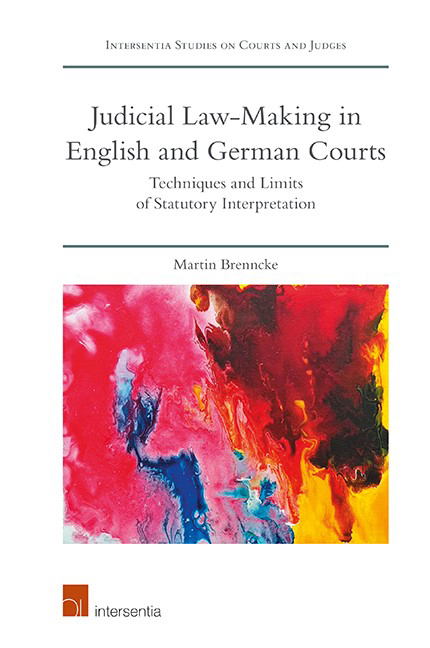Book contents
- Frontmatter
- Dedication
- Foreword
- Preface
- Contents
- List of Case
- List of Abbreviation
- Chapter 1 Introduction
- Chapter 2 Conventional Canons of Statutory Interpretation
- Chapter 3 Rights-Consistent Interpretation
- Chapter 4 The European Legal Duty of Conforming Interpretation
- Chapter 5 Conclusion
- Index
- About the Author
Chapter 5 - Conclusion
Published online by Cambridge University Press: 26 January 2019
- Frontmatter
- Dedication
- Foreword
- Preface
- Contents
- List of Case
- List of Abbreviation
- Chapter 1 Introduction
- Chapter 2 Conventional Canons of Statutory Interpretation
- Chapter 3 Rights-Consistent Interpretation
- Chapter 4 The European Legal Duty of Conforming Interpretation
- Chapter 5 Conclusion
- Index
- About the Author
Summary
In this Chapter, I will first tie together key developments of conventional, rightsconsistent and conforming judicial law-making in each jurisdiction and then draw comparative conclusions.
For German judicial practice, I have demonstrated in Chapters 2, 3 and 4 that the modern-day highest courts in Germany attach an increased weight to the intention of the enacting legislature in cases of judicial law-making, compared with case law in the second half of the 20th century. This change goes hand in hand with German courts giving an increased weight to the legislative history of a provision in recent times. It is unclear what has caused this change in judicial attitudes but one explanation seems to be a change in judicial mindset in contemporary judges in the BVerfG about the separation of powers between the legislature and the judiciary. This development certainly deviates from cases like Soraya. It also affects the outer limits of judicial law-making as it is mostly the weighing of the interpretative criteria in an individual case that ultimately determines whether or not these limits are exceeded. This development in newer German case law brings the interpretative powers of German judges closer to the powers of English judges recognised under conventional judicial law-making.
Time will tell whether these signs of a change in judicial attitudes indicate a return from the jurisprudence of values (Wertungsjurisprudenz), the predominant legal theory in Germany in the second half of the 20th century, back to the jurisprudence of interests (Interessenjurisprudenz), the predominant legal theory in Germany at the beginning of the 20th century. Both legal theories recognise that judicial law-making is a necessary and permissible function of the judge. They recognise that statutory interpretation contains not only formal legal reasoning, but also evaluative arguments and discretion. Both theories disagree about where the values that influence judicial decision-making ought to stem from. The theory of Interessenjurisprudenz is positivistic. It aims to restrict the evaluative scope available to the judge by binding the judge to the aims and interests of the enacting legislature. Wertungsjurisprudenz creates evaluative scope for the judge in order to enable the judge to take into account values that the enacting legislature did not contemplate when creating the statute or values that are external to the legislation at issue, such as values stemming from the German Basic Law.
- Type
- Chapter
- Information
- Judicial Law-Making in English and German CourtsTechniques and Limits of Statutory Interpretation, pp. 423 - 432Publisher: IntersentiaPrint publication year: 2018



